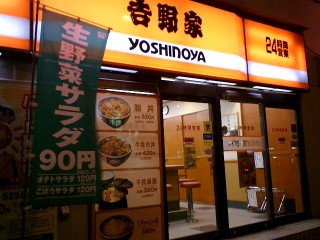Loading
Search
▼ Beef bowl chains struggling to survive
- Category:Other

THE YOMIURI SHIMBUN
Gyudon beef bowl chains, which once saw rapid growth amid the nation’s prolonged deflation, are now struggling to survive amid a labor shortage and soaring beef prices.
Two of the three major gyudon chain operators in the nation posted consolidated net losses in their first-half financial settlements for fiscal 2014. Zensho Holdings Co., which operates the Sukiya gyudon restaurant chain, said Thursday it incurred a consolidated net loss of ¥2.2 billion in the April-September period. The firm reported a ¥400 million profit in the previous term.
Zensho expects a net loss of ¥7.5 billion for fiscal 2014 ending in March.
Matsuya Foods Co., the operator of Matsuya restaurants, has said the group’s net profit in the April-September period decreased by 85.4 percent, to ¥26 million, compared to the same period of the previous year.
Yoshinoya Holdings Co. just managed to stay in the black in revenue and profits in the March-August period, but the firm is pessimistic about the overall situation. Yoshinoya Holdings reported a ¥900 million after-tax profit in the midterm settlement, which is close to its full-year forecast of ¥1 billion.
Nevertheless, Yoshinoya President Yasutaka Kawamura left the full-year forecast unchanged, saying the company’s future prospects remain unclear.
Due to signs of an economic upturn, the average hourly wage for part-time jobs in Tokyo and neighboring prefectures is now more than ¥1,000. At the same time, the market price of beef ranges from 1.4 times to two times as much as a year ago, the companies said. The weaker yen is expected to further increase import costs for their primary materials.
Losing momentum
Gyudon restaurant chains rapidly spread across the nation in the 1990s, thanks to their cheap, quick dishes. The major gyudon chains had a total of about 500 outlets nationwide at that time, and the three major operators have raised their number to about 4,000 over the past about 20 years.
The operators attracted public attention as a food service business that survived the deflationary economy. At one point, they waged a fierce price war that had sent the price of a gyudon bowl below ¥300.
However, as the nation has managed to emerge from its long period of deflation, an increasing number of customers are seeking high-quality products. Known for their inexpensive dishes, gyudon restaurant chains are now losing their momentum, observers said.
- November 17, 2014
- Comment (0)
- Trackback(0)

